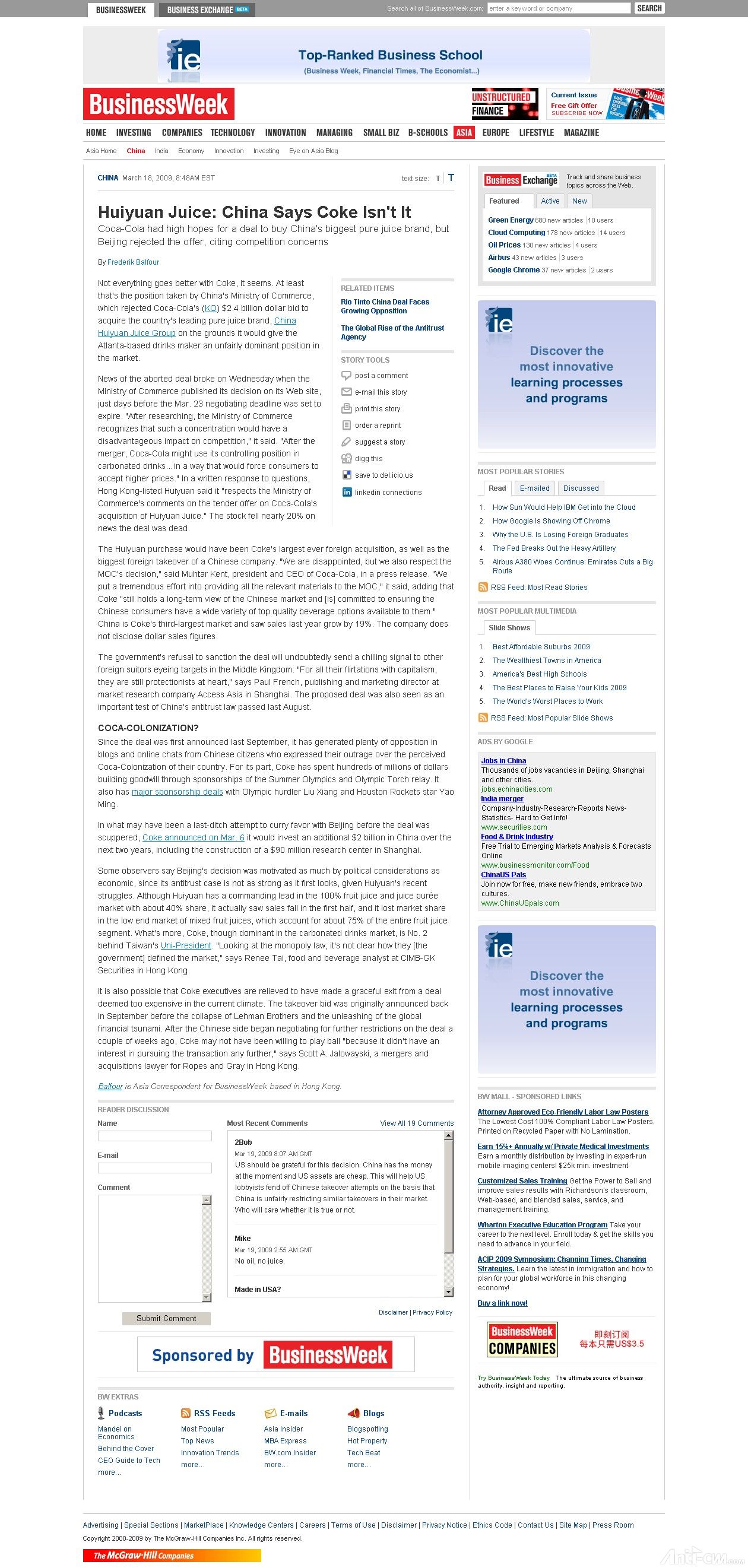|
|
http://www.businessweek.com/globalbiz/content/mar2009/gb20090318_570130.htm Huiyuan Juice: China Says Coke Isn't ItCoca-Cola had high hopes for a deal to buy China's biggest pure juice brand, but Beijing rejected the offer, citing competition concerns
Not everything goes better with Coke, it seems. At least that's the position taken by China's Ministry of Commerce, which rejected Coca-Cola's (KO) $2.4 billion dollar bid to acquire the country's leading pure juice brand, China Huiyuan Juice Group on the grounds it would give the Atlanta-based drinks maker an unfairly dominant position in the market.
News of the aborted deal broke on Wednesday when the Ministry of Commerce published its decision on its Web site, just days before the Mar. 23 negotiating deadline was set to expire. "After researching, the Ministry of Commerce recognizes that such a concentration would have a disadvantageous impact on competition," it said. "After the merger, Coca-Cola might use its controlling position in carbonated drinks…in a way that would force consumers to accept higher prices." In a written response to questions, Hong Kong-listed Huiyuan said it "respects the Ministry of Commerce's comments on the tender offer on Coca-Cola's acquisition of Huiyuan Juice." The stock fell nearly 20% on news the deal was dead.
The Huiyuan purchase would have been Coke's largest ever foreign acquisition, as well as the biggest foreign takeover of a Chinese company. "We are disappointed, but we also respect the MOC's decision," said Muhtar Kent, president and CEO of Coca-Cola, in a press release. "We put a tremendous effort into providing all the relevant materials to the MOC," it said, adding that Coke "still holds a long-term view of the Chinese market and [is] committed to ensuring the Chinese consumers have a wide variety of top quality beverage options available to them." China is Coke's third-largest market and saw sales last year grow by 19%. The company does not disclose dollar sales figures.
The government's refusal to sanction the deal will undoubtedly send a chilling signal to other foreign suitors eyeing targets in the Middle Kingdom. "For all their flirtations with capitalism, they are still protectionists at heart," says Paul French, publishing and marketing director at market research company Access Asia in Shanghai. The proposed deal was also seen as an important test of China's antitrust law passed last August.
Coca-Colonization?Since the deal was first announced last September, it has generated plenty of opposition in blogs and online chats from Chinese citizens who expressed their outrage over the perceived Coca-Colonization of their country. For its part, Coke has spent hundreds of millions of dollars building goodwill through sponsorships of the Summer Olympics and Olympic Torch relay. It also has major sponsorship deals with Olympic hurdler Liu Xiang and Houston Rockets star Yao Ming.
In what may have been a last-ditch attempt to curry favor with Beijing before the deal was scuppered, Coke announced on Mar. 6 it would invest an additional $2 billion in China over the next two years, including the construction of a $90 million research center in Shanghai.
Some observers say Beijing's decision was motivated as much by political considerations as economic, since its antitrust case is not as strong as it first looks, given Huiyuan's recent struggles. Although Huiyuan has a commanding lead in the 100% fruit juice and juice purée market with about 40% share, it actually saw sales fall in the first half, and it lost market share in the low end market of mixed fruit juices, which account for about 75% of the entire fruit juice segment. What's more, Coke, though dominant in the carbonated drinks market, is No. 2 behind Taiwan's Uni-President. "Looking at the monopoly law, it's not clear how they [the government] defined the market," says Renee Tai, food and beverage analyst at CIMB-GK Securities in Hong Kong.
It is also possible that Coke executives are relieved to have made a graceful exit from a deal deemed too expensive in the current climate. The takeover bid was originally announced back in September before the collapse of Lehman Brothers and the unleashing of the global financial tsunami. After the Chinese side began negotiating for further restrictions on the deal a couple of weeks ago, Coke may not have been willing to play ball "because it didn't have an interest in pursuing the transaction any further," says Scott A. Jalowayski, a mergers and acquisitions lawyer for Ropes and Gray in Hong Kong.
Balfour is Asia Correspondent for BusinessWeek based in Hong Kong.

|
Coke, Huiyuan, isn, Juice, says, Coke, Huiyuan, isn, Juice, says, Coke, Huiyuan, isn, Juice, says
|